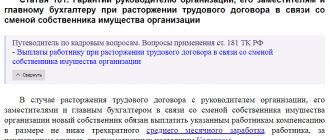In addition to the grounds provided for by this Code and other federal laws, an employment contract with the head of an organization is terminated on the following grounds: 1) in connection with the removal from office of the head of the debtor organization in accordance with insolvency (bankruptcy) legislation; 2) in connection with the adoption by the authorized body of a legal entity, or the owner of the organization’s property, or a person (body) authorized by the owner of a decision to terminate the employment contract. The decision to terminate an employment contract on the specified basis in relation to the head of a unitary enterprise is made by the body authorized by the owner of the unitary enterprise in the manner established by the Government of the Russian Federation; 3) on other grounds provided for in the employment contract.
Grounds for terminating an employment contract with a manager
Conventionally, all grounds for dismissing a manager can be divided into the following groups:
- Valid for the entire circle of persons with whom the agreement is concluded. Their list is contained in Art. 77 of the Labor Code of the Russian Federation (mutual decision of the parties, expiration of the employment agreement, etc.).
- Related to the will of the employer or due to the guilty actions of the dismissed person (for example, if an unfounded decision of a manager resulted in damage to the legal entity or a failure to fulfill the duties specified in the employment contract was recorded).
- Provided by labor legislation for terminating a contract with a manager as a special subject of labor relations: termination of a contract by a court decision in the bankruptcy process, on the initiative of the founder of an LLC, the owner of a state-owned enterprise, shareholders, in accordance with the laws on joint-stock companies and LLCs, as well as the procedure for concluding employment contracts, approved by Government Decree No. 234 of March 16, 2000 (hereinafter referred to as Order No. 234).
According to generally accepted practice, termination of an agreement with a managerial employee on the initiative of a body of a legal entity that has the appropriate powers, as well as the owner of the organization’s property complex or a person who is endowed with such a right by the owner of the property, has no special motives. Termination of the contract on this basis may be dictated by changes in the field of business strategy, the desire to increase the efficiency of enterprise management, and make qualitative improvements. Thus, the decision is made primarily in the interests of the owner and, as a rule, is dictated by the need to preserve property, increase the organization’s profits, etc.
However, the absence of requirements for indicating the reasons for dismissal does not mean that the employer is allowed to abuse this right. Practice shows that challenging dismissal under clause 2, part 1, art. 278 of the Labor Code is possible if there is evidence of discrimination or other violations on the part of the legal entity.
ConsultantPlus has many ready-made solutions, including the article: “Some problems of terminating an employment contract with the head of an organization under clause 2 of Art. 278 of the Labor Code of the Russian Federation.” If you don't have access to the system yet, you can sign up for a free trial online! You can also get the current K+ price list.
Position of the courts
The following may be evidence of an employer’s abuse of the right to dismiss management:
- Dismissal is contrary to the interests of the organization. As an example, we can cite the case of reinstatement of a school director, when the court was guided by the fact that the head of the municipality was obliged to take into account public demands for the director to retain his job and the numerous merits of the dismissed person in the field of education (appeal ruling of the Irkutsk Regional Court dated 09/06/2012 in the case No. 33-7355/2012).
- Gross violation of the rules of dismissal, including exclusion from work when a decision on reinstatement has already been made and subsequent repeated termination of the contract (Determination of the Moscow Regional Court dated February 20, 2012 No. 33-3644/2012).
In addition, the Constitutional Court notes that termination of an agreement on the specified basis is not a measure of legal liability in the event of guilty actions. According to the judges, the legal status of the manager differs from the status of other employees in that he manages the company’s property, organizes the labor process, enters into labor relations with employees on behalf of the legal entity, represents the interests of the enterprise in government bodies, as well as when concluding agreements with contractors, performs other functions to implement the rights and obligations of the company as a participant in the economic process. At the same time, in accordance with paragraph 3 of Art. 53 of the Civil Code of the Russian Federation, the manager is obliged to act rationally and in good faith, since the effectiveness of the organization depends on his activities.
Norm clause 2, part 1, art. 278 of the Labor Code of the Russian Federation was recognized by the Constitutional Court of the Russian Federation as not contrary to the position of the legislator regarding the rights of workers enshrined in the Constitution of the Russian Federation, since the essence of the reason for the dismissal of a manager corresponds to the nature of the position held (see resolution of the Constitutional Court dated March 15, 2005 No. 3-P).
What groups of reasons for dismissal are identified in Article 278 of the Labor Code of the Russian Federation?
Art. 278 of the Labor Code of the Russian Federation, which contains a list of additional reasons for the dismissal of managers, is applicable only to those of them who are employees (Article 273 of the Labor Code of the Russian Federation). These reasons are divided into 3 groups and are associated with:
- bankruptcy of a legal entity (clause 1);
- decision of the owner (clause 2);
- terms of the employment contract (clause 3).
For information on how to fire a manager who has not completed the probationary period, read the article “Probationary period when hiring (nuances).”
Who can fire a manager under clause 2, part 1, art. 278 Labor Code of the Russian Federation
The text of the norm under study provides a list of subjects who can fire a manager:
- A body of a legal entity that has the appropriate rights. According to sub. 4 paragraphs 2 art. 33 of the Law “On Limited Liability Companies” dated 02/08/1998 No. 14-FZ (hereinafter referred to as the LLC Law), a meeting of investors who have invested in the authorized capital of the company has the right to terminate the powers of the managers. The board of directors is also vested with the right to regulate the activities of executive bodies, taking into account the provisions of sub-clause. 2 clause 2.1 art. 32 of the LLC Law. Similar rules regarding the meeting of shareholders and the highest executive body are contained in subparagraph. 8 clause 1 art. 48, as well as sub. 9 clause 1 art. 65 of the Law “On Joint Stock Companies” dated December 26, 1995 No. 208-FZ (hereinafter referred to as the JSC Law).
- Owners of the property of a legal entity (hereinafter referred to as the owners). According to Art. 213 of the Civil Code of the Russian Federation, the owner of property formed from deposits is the legal entity itself. Thus, the wording of clause 2, part 1, art. 278 of the Labor Code of the Russian Federation contains some ambiguity, since the property rights of a legal entity are separated from the rights of the investor. Nevertheless, under the owners in paragraph 2 of part 1 of Art. 278 of the Labor Code of the Russian Federation should be understood specifically as the founders of a legal entity, based on the provisions of Art. 28 and 29 of the LLC Law on contributions of company participants and their receipt of profit, Art. 58 on the distribution of property after liquidation, similar provisions of the law on joint stock companies. The Constitutional Court of the Russian Federation speaks about this in Resolution No. 3-P dated March 15, 2005, according to which the owners of the organization are citizens who carry out economic activities through the creation of a commercial organization and use their property for this. The owner of the property complex of unitary enterprises, according to Art. 214 and 215 of the Civil Code of the Russian Federation, the Russian Federation, its constituent entities, as well as municipal authorities act. Issues of appointing a manager and his dismissal are resolved in accordance with the law on unitary enterprises dated November 14, 2002 No. 161-FZ and Procedure No. 234.
- Society members. Just like shareholders, company members can act at meetings through representatives - this is permitted provided that the power of attorney meets the following requirements (Part 2, Article 37 of the LLC Law, Clause 1, Article 57 of the JSC Law):
- contains complete information about the principal and representative;
- notarized or executed in accordance with the rules of paragraphs. 4 and 5 tbsp. 185 of the Civil Code of the Russian Federation - an agreement for the representation of interests.
Local regulations play an important role in dismissal: an action committed by an unauthorized person or body will be declared illegal by the court.
Commentary on Article 278 of the Labor Code of the Russian Federation
The commented article contains additional grounds for terminating an employment contract with the head of an organization. In the new edition of the article under consideration, these include:
1) termination of employment relations in connection with the removal from office of the head of the debtor organization in accordance with the legislation on insolvency (bankruptcy). The Federal Law “On Insolvency (Bankruptcy)” provides specific grounds for the removal from office of the head of the debtor organization (Articles 66, 69, 82, 83). Article 69 of this Federal Law provides for the removal from office of the head of the debtor organization from the moment of the introduction of external management. In connection with the removal of a manager from office, he may be transferred with his consent to another job, or the employment contract with him will be terminated under paragraph 1 of the commented article.
Removal from office of the head of the debtor organization may be carried out in cases provided for by this Law; at the request of a temporary or administrative manager, based on a request from a meeting of creditors, etc.
The next indispensable basis for removing the head of the debtor organization from office is the ruling of the arbitration court that considered such a petition.
Since the procedure for terminating an employment contract with the head of the debtor organization in connection with his removal from his position is not regulated by law, we believe that the termination of an employment contract with him under clause 1 of Art. 278 of the Labor Code must be carried out in compliance with the general rules. He must be familiarized with the dismissal order, and on the day of dismissal he must be given a work book.
Termination of an employment contract with the head of an organization in connection with removal from office is carried out by the employer represented by an authorized body of a legal entity or the owner of the property, or a person (body) authorized by the owner;
2) in connection with the adoption by the authorized body of a legal entity or the owner of the organization’s property, or a person (or body) authorized by the owner of a decision to terminate it. Previously, this rule was contained in Art. 279 TK. As follows from the text of the above norm, termination of an employment contract depends only on the presence of a decision of bodies or persons vested with the appropriate powers. The text of the norm in question also allows us to conclude that the need to terminate an employment contract with the head of an organization does not require reference to certain specific circumstances. This, in turn, gave rise to the opinion in law enforcement practice that the norm in question was unconstitutional.
Of great importance for resolving this issue is the Resolution of the Constitutional Court of the Russian Federation dated March 15, 2005 N 3-P “In the case of verifying the constitutionality of the provisions of paragraph 2 of Article 278 and Article 279 of the Labor Code of the Russian Federation and the second paragraph of paragraph 4 of Article 69 of the Federal Law “On Joint-Stock Companies” "in connection with requests from the Volkhov City Court of the Leningrad Region, the Oktyabrsky District Court of the city of Stavropol and complaints from a number of citizens" <1>. Clause 2 of Art. 278 TC and a similar provision, paragraph. 2 clause 4 art. 69 of the Federal Law “On Joint-Stock Companies,” which gave rise to contradictory practices and very diverse comments from specialists, were recognized as consistent with the Constitution of the Russian Federation. The Constitutional Court of the Russian Federation did not see in the rules allowing for the early dismissal of the head of an organization without indicating specific motives for terminating the employment contract, a violation of the constitutional rights and freedoms of citizens.
——————————— <1> NW RF. 2005. N 13. Art. 1209.
From the previous edition of paragraph 2 of Art. 278, which established the possibility of dismissal of the head of an organization in connection with the adoption by an authorized body of a legal entity or the owner of the organization’s property, or a person (body) authorized by the owner of a decision on early termination of an employment contract with him, the concept “early” was excluded, since it gave rise to challenge the validity of this clause in relation to persons who have entered into an employment contract for an indefinite period.
Clause 2 of Art. 278 establishes that the basis in question does not apply to managers of unitary enterprises. The decision to terminate an employment contract on the specified basis in relation to the head of a unitary enterprise is made by the body authorized by the owner of the unitary enterprise in the manner established by the Government of the Russian Federation.
When applying paragraph 2 of Art. 278 of the Labor Code, the question arose about the unjustified restriction of the rights of the heads of the organization, since dismissal on this basis can only be challenged from the point of view of the decision-making procedure by the authorized body, and in the case of dismissal of the head of a unitary enterprise, it is impossible to even challenge the procedure for making such a decision, since it is made solely by the body , authorized owner. In this regard, it should be noted that in order to ensure the labor rights of the head of the organization, upon his dismissal, it is necessary to comply with all guarantees established by law.
In paragraph 50 of the Resolution of the Plenum of the Armed Forces of the Russian Federation dated March 17, 2004 N 2, it is noted that Art. 3 of the Labor Code prohibits restricting anyone’s labor rights and freedoms depending on their official position. It also draws attention to the fact that the dismissal of the head of an organization in connection with the adoption by an authorized body of a legal entity or the owner of the organization’s property, or a person (body) authorized by the owner of a decision on early termination of an employment contract is, in essence, dismissal at the initiative of the employer, and ch. . 43 of the Labor Code, which regulates the specifics of the work of the head of an organization, does not contain rules that deprive these persons of generally established guarantees upon termination of an employment contract. So, in particular, it refers to the guarantee established by Part 3 of Art. 81 of the Labor Code in the form of a general ban on the dismissal of an employee at the initiative of the employer during a period of temporary disability and while on vacation (except in the case of liquidation of an organization or termination of the activities of an individual employer). Consequently, even upon termination of the employment contract with the manager under clause 2 of Art. 278 of the Labor Code, an employment contract with the head of an organization cannot be terminated during the period of his temporary incapacity for work or while on vacation;
3) on other grounds provided for in the employment contract. First of all, it should be borne in mind that these additional grounds must be clearly, clearly and specifically worded; they must be related to the functions (responsibilities) of the head of the organization, both the employer and the employee.
Thus, in accordance with paragraph 2 of the Decree of the Government of the Russian Federation of March 16, 2000 N 234 “On the procedure for concluding employment contracts and certification of heads of federal state unitary enterprises” (as amended on June 20, 2011) <1> federal executive authorities when concluding a labor contract of an agreement with the head of a federal state unitary enterprise has the right to provide in the employment contract additional grounds for its termination. For example, as such a basis, an employment contract may provide for the presence at a unitary enterprise, through the fault of its manager, of more than three months of wage arrears, as well as the violation by the head of a unitary enterprise of the prohibition established by law and the employment contract on the implementation of certain types of activities, etc. . The same basis may include distortion of reporting provided by the Government of the Russian Federation, as well as other violations committed by the head of the organization.
——————————— <1> NW RF. 2000. N 13. Art. 1373; 2006. N 13. Art. 1408; N 47. Art. 4897; 2008. N 11 (part 1). Art. 1030; 2010. N 2. Art. 234; 2011. N 28. Art. 4203.
Guarantees provided upon termination of relations with the manager
The peculiarity of dismissal due to the circumstances under consideration is that the manager is deprived of such social guarantees as the provision of other vacancies and payment of benefits in the amount of 2 weeks' average salary (Article 178 of the Labor Code of the Russian Federation). In ch. 43 of the Labor Code of the Russian Federation also does not establish the employer’s obligation to warn about the upcoming termination of the contract, which is confirmed by judicial practice. As an example, we can cite the refusal of claims for reinstatement at work, motivated by the lack of warning to the former manager, contained in the rulings of the Moscow Regional Court dated October 22, 2014 in case No. 33-23615/2014, the Irkutsk Regional Court dated January 15, 2015 in case No. 33- 19/2015, Rostov Regional Court dated 08/29/2013 in case No. 33-10956/2013).
Subscribe to our newsletter
Yandex.Zen VKontakte Telegram
Special guarantees for the dismissal of a manager on the grounds under consideration are:
- compensation, the amount of which cannot be less than 3 times the average monthly salary (Article 279 of the Labor Code);
- the impossibility of terminating an employment relationship during a person’s vacation or incapacity for work (clause 50 of the resolution of the Plenum of the Supreme Court of the Russian Federation dated March 17, 2004 No. 2).
IMPORTANT! The Constitutional Court of the Russian Federation, in Resolution No. 3-P dated March 15, 2005, clarifies that the absence of a reference to Art. 279 of the Labor Code of the Russian Federation or any other stipulated condition for compensation upon dismissal of a manager does not relieve the employer of the obligation to pay it.
The calculation of compensation is based on the amount of average daily earnings, in accordance with clause 9 of the regulation on the specifics of the procedure for calculating the average salary, approved. Decree of the Government of the Russian Federation dated December 24, 2007 No. 922. According to clause 15 of this provision, bonuses and remunerations are taken into account in the calculation.
According to Part 3 of Art. 139 of the Labor Code of the Russian Federation, the average daily earnings is equal to the quotient of all salaries for 12 months and the number of working days. When determining the number of working days, it does not take into account sickness time, maternity leave, the time for which the employee retained the average salary (with the exception of breaks to feed a minor), periods of downtime, strikes if the employee did not participate in it, etc.
Calculation of compensation provided for in Art. 279 of the Labor Code of the Russian Federation, is done as follows: the number of working days according to the production calendar per month (starting from the next day after dismissal), multiplied by the average daily salary, is multiplied by 3.
Compensation for the manager upon dismissal
The procedure for dismissing a manager has a number of important differences. Firstly, if we are talking about termination of the contract by decision of the judicial authorities, then the person is deprived of a number of social guarantees, in particular, the offer of another place of service, payment of a two-week salary.
Secondly, there are special privileges:
- provision of compensation, the amount of which is not less than three months’ salary;
- prohibition on dismissal during vacation or temporary disability.
It is important to know! Even if the employment contract does not indicate the obligation to pay compensation, the employer must provide it. The amount is calculated based on the average daily income of a citizen, taking into account bonuses and other remunerations. The period for analysis is the last twelve months.
Additional cash benefits are not paid if the dismissal is due to the bankruptcy of the enterprise, the expiration of the contract, or the initiative of the employee himself. But if the owner of the company’s property changes, then the transfer of compensation is necessary.
The procedure for dismissing a manager on the basis of clause 2, part 1, art. 238 Labor Code of the Russian Federation
The process of terminating the employment relationship on the basis under consideration involves the following stages:
- Coordination and adoption by the participants of the legal entity or other eligible entities of the decision on termination, taking into account the provisions of the laws on LLCs and JSCs (depending on the form of ownership of the organization), Procedure No. 234, as well as local regulations.
- Issuance of a dismissal order, which is carried out by the sole body itself in the last days of performing work functions.
- Preparation of documents in the Unified State Register of Legal Entities regarding upcoming changes.
- Transfer of affairs from the old manager to the new one.
- Making an entry in your personal card and work book.
- Calculation of wages and compensations, issuance of work books and income certificates.
- Hiring a new director.
- Notification of interested parties (tax office, counterparty, servicing bank) about the change of director.
Stages of termination of employment relationship
Let's consider the sequence of steps when terminating a business relationship with a manager in accordance with paragraph 2 of Article 278 of the Labor Code:
- Making a decision to dismiss a person holding a management position by a circle of authorized persons.
- Issuance of an order, which is formed by the responsible body a few days before the employee leaves.
- Preparation of a package of documents for the unified state register of legal entities regarding changes.
- Transfer of cases and documents to the new manager.
- Entering information about dismissal into the employee’s personal file and work book.
- Carrying out financial calculations by the accounting department - salary for the last period, unused vacation and compensation.
- Acceptance of a new director and notification of counterparties, in particular the tax service, bank and others.
If the cycle is violated, the company not only faces difficulties with paperwork, but also administrative sanctions in the form of monetary fines. Please note that dismissal without explanation is permissible under Article 278.






